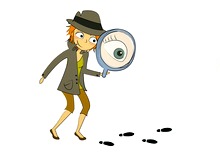| Back to Back Issues Page |
 |
|
English Detective #35, Superhero Healing: Mar 25 2014 March 25, 2014 |
The current investigation (Introducing this issue):
It’s time to shorten the reading and vocabulary sections of English Detective, now that we have introduced and practiced the complete Academic Word List. (A few words still need more practice. I’ll try to add gap-fill readings or other practice activities from time to time). This week there’s one more outstanding TED talk on new ways to help people with spinal cord injuries. After this, I will aim for just one main reading (or sometimes one short talk— usually under 10 minutes), with a link or two to more information in case you have time and interest to follow up. I’ll try to have more varied practice activities, with idioms and writing exercises as well as crosswords, games, and quizzes. In this issue’s talk, Swiss neuroscientist Grégoire Courtine tells how he was inspired by Christopher Reeves to focus his research on the practical needs of patients with spinal cord injuries. (Reeves was the actor who played Superman before becoming paralyzed after a bad injury.) Courtine and his team had to learn to think about nerve function in a different way. They finally found a way to “awaken” injured nerves and help them work again. Working first with rats and then with people, the scientists have started to discover possibilities for restoring function in conditions previously considered hopeless. Practice some of this vocabulary with a crossword on the nervous system (available in interactive online form or as a pdf to download). If you are interested, there’s also a link to a history of treating spinal cord injuries on the Christopher and Dana Reeves Foundation website. 
Your First Clue: Vocabulary Emphasized in this Issue
Review vocabulary: injury. New vocabulary: axons, damage, locomotor, neurons/neural, paralysis, prosthesis, rehabilitation, spinal cord. A few notes about the new vocabulary:
Most of this vocabulary is discussed in the introduction to the Nervous System online crossword puzzle page. The remaining words are explained below. Paralysis is an inability to move. Quadraplegia (meaning 4-part paralysis in Greek) means a person is unable to move either their arms or legs. A person who can move their arms but has the lower part of their body paralyzed is paraplegic. A prosthesis is an artificial limb designed to replace a missing hand or foot, part of an arm or leg, or other missing body part. Rehabilitation is the process of helping sick or injured people recover as much of their strength and function as possible. Therapists help their clients (patients) exercise and practice the movements or activities that they cannot yet do on their own. Getting the whole story: reading/listening practice:
Click here for Mr. Courtine’s talk. Here is the link to the Reeves’ Foundation information on spinal cord research. Follow the Clues (Vocabulary Practice):
Click here for the interactive crossword page. (The links to the pdf crossword and its answers are at the top of the page.) A note if you get gmail: Have you missed any issues of English Detective? if you find English Detective in your Promotions box, you can move it to your Primary box (if you want) by clicking on it and dragging it there, then clicking Yes when asked if you want to always get it in the Primary box. Coming in the next issue: New Hope for Alzheimer’s disease. In case you missed these: Earlier issues of English Detective have articles on a number of topics, plus practice with all 570 words from the Academic Word List. You can check them out with the link to the back issues page below (or find what words were practiced each issue here. P.S. If youare not already getting English Detective, you can subscribe by completing the form here. (It's free!) |
| Back to Back Issues Page |